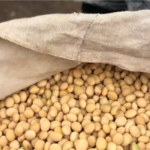
The Soya Value Chain Association of Ghana (SVCAG) has called on the government to immediately suspend the ban on soybean exports, warning that the restriction has crippled the market, pushed farmers into debt, and threatens to collapse the northern economy.
Executive Secretary of the Association, Yaw Afrifa, described the policy as “a human rights crisis,” arguing that it has left farmers stranded with unsold produce and forced many processors out of business.
“Prices have crashed from about GHS 1,200 per 100kg bag in 2023 to just around GHS 500 this year,” he revealed.
“The cost of production alone stands around GHS 550 to 600, meaning farmers are selling at a loss. This is not just a policy failure—it’s destroying livelihoods.”
The export ban, introduced under the 2022 Export and Import (Restrictions on Exportation of Grains) Regulations, took effect in December 2024 as part of efforts to protect Ghana’s food security. However, almost a year later, farmers and processors say the policy has done more harm than good.
According to Mr Afrifa, Ghana’s non-GMO soybeans previously attracted strong international demand from countries such as India, China, and parts of Europe. But since the imposition of the ban, the country’s once-thriving soybean sector has been “brought to its knees.”
“Many processors have shut down or cut operations due to competition from cheap imported soya meal,” he lamented.
“The few that remain are mostly foreign-owned. So not only are Ghanaian farmers losing money, but the local agribusiness space is being taken over by foreign players.”
He criticised the government for imposing a “blanket ban” rather than introducing a transparent, permit-based export system.
“If we can’t support local processors, then allow farmers to export within controlled limits. Otherwise, we’re killing livelihoods in the name of food security,” he urged.
The Peasant Farmers Association of Ghana (PFAG) has also joined the call for the ban’s review. Its Executive Director, Bismark Owusu Nortey, said the restrictions have hurt not only soybean farmers but also feed processors and poultry producers who rely heavily on soybeans as a key input.
“When farmers can’t sell, processors can’t plan, and the entire livestock industry suffers,” he explained. “This ban has done more harm than good.”
Mr. Nortey warned that if the situation persists, many farmers will abandon soybean cultivation altogether in the next planting season—a move that could severely undermine national food security.
“If this continues, next season farmers will not plant, and that will be a bigger threat to food security than exports,” he cautioned.
Both associations are urging the government to lift the export ban, reconstitute the export permit committee to include representatives of farmers and processors, and ensure transparency in managing agricultural intervention funds.
“As we approach Farmers’ Day, the government must decide whether it truly values farmers or just the rhetoric,” Mr. Afrifa stressed. “We don’t need speeches; we need policies that let us survive.”
Mr. Nortey added that urgent action is necessary to prevent a complete collapse of the soybean value chain.
“If the government does not act now, Ghana will soon be importing everything it can no longer grow. Farmers are losing hope, and when they stop planting, the nation will feel the real impact,” he said.